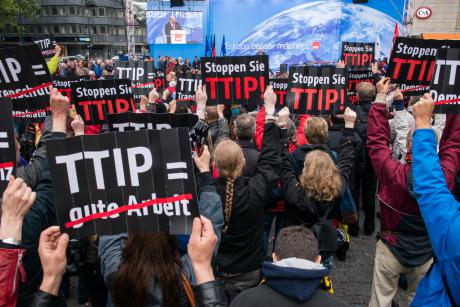TTIP contradicts post-2015 development goals, experts say

Euractiv | 11 June 2014
TTIP contradicts post-2015 development goals, experts say
The planned US-EU trade deal, the Transatlantic Trade and Investment Partnership (TTIP), has come up against intense criticism from both sides of the Atlantic. Now development officials have joined the choir, and are warning that the agreement will undermine the UN’s post-2015 development agenda. EurActiv Germany reports.
As if the quickly approaching deadline for the UN’s post-2015 development goals were not enough, experts have warned that the planned Transatlantic Trade and Investment Partnership (TTIP) between the EU and the US threatens to contradict global development targets.
Just over one year remains for UN members to agree on a post-2015 development framework. September 2015 marks the planned expiration of the UN’s Millennium Development Goals (MDGs). By then, all 193 UN members plan to have agreed on a new set of targets.
But even before the Sustainable Development Goals (SDGs) can be laid down, many obstacles stand in the way of a smooth transition.
"We must not make the mistake of discussing SDGs and setting targets on the one hand, while simultaneously concluding a trade agreement which contradicts all of these", said Stefan Rebmann, a parliamentarian from the Social Democratic Party (SPD) in the German Bundestag and deputy chairman of the Committee on Economic Cooperation and Development.
Rebmann offered a concrete example. Of the eight fundamental labour conventions established by the International Labour Organisation (ILO), the US has only recognised two.
What effect does that have, Rebmann asked, if it is endorsed under the guise of TTIP? And how, he continued, can northern countries insist on compliance with labour standards in SDG negotiations, or in free trade talks with developing countries, when the US does not abide by these itself?
The African Union’s representative in Brussels, Ajay Bramdeo, could also not rule out negative consequences from TTIP for developing countries, he said in a statement for EurActiv Germany. If the world’s two biggest economic blocs make such a move, Bramdeo said he is certain it will affect the rest of the world.
>> Read: African countries feel cornered in EU trade negotiations
Klaus Schilder from the development NGO MISEREOR expressed a similar opinion. "If [TTIP] is implemented, it will set global standards in trade and investment for the next decades,” he said.
At that point, Schilder indicated, developing countries will not be able to negotiate better deals at both the bilateral and trilateral levels.
This is precisely the reason, Ambassador Bramdeo told EurActiv Germany, why Africans are closely observing negotiations between Americans and Europeans.
Dr. Jekyll and Mr. Hyde
Germany’s Federal Development Ministry (BMZ) is also keeping a watchful eye on TTIP. But the ministry’s Daniela Zehentner-Capell said that for the time being, there is no evidence indicating possible effects, positive or negative, TTIP could have on parallel negotiations with developing countries.
Two studies reached differing results, she said, but it is still too early to refer to a "Dr. Jekyll and Mr. Hyde dimension" within the TTIP agreement.
Rebmann is convinced. "We must not see SDGs as being detached from economic and trade agreements being negotiated in parallel," he said.
He also reminded his colleagues in the Bundestag of their responsibilities. Parliamentarians must bite the bullet and assess the potential global effects TTIP could have, he added.
But to do this, he said, more transparency is needed. Not even German Economics Minister Sigmar Gabriel is aware of the exact state of TTIP negotiations, said Rebmann, and that is a "democratic deficit."
Patrick Timmann | EurActiv Germany





